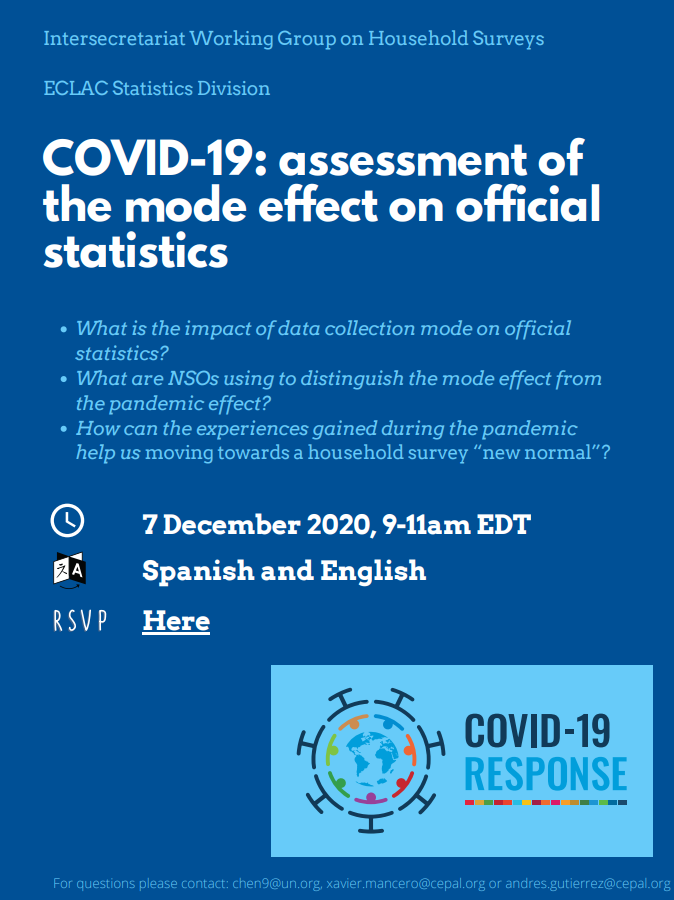Department of Economic and Social Affairs
Concept note on "COVID-19: assessment of the mode effect on official statistics" by ISWGHS and ECLAC Statistics Division
Since the health emergency arising from the global COVID-19 pandemic, national statistical offices (NSOs) had to interrupt primary information collection abruptly as part of many of their statistical operations, including household surveys. Considering the rapid spread of the disease, governments had imposed curfews, movement restrictions, and compulsory quarantines, among other health measures.
These restrictions have eventually led to the suspension of face-to-face data collection for household surveys. NSOs had to carry out surveys over the telephone. This change in the collection methodology was necessary for the continuity of employment and poverty figures.
During the pandemic, ECLAC had published a series of recommendations1 focused on maintaining the best methodological and technical practices within NSO processes. These documents were broadly disseminated and discussed through several webinars with the support of the Transmission Knowledge Network of the ECLAC Americas Statistical Conference. Among others, ECLAC recommendations for returning to a “new normal” included to consider a transition period in which telephone operations continue to be carried out, maintaining flexibility, and noting that new confinements in some areas are possible; to adopt technical procedures for eliminating coverage and selection biases, as regular processes for household surveys inside NSO; to separate the effect of the collection mode changes from the impact of the pandemic trying to maintain mixed-mode collection schemes during a reasonable time in the post-pandemic period.
COVID-19 and its impact on household surveys are also covered by the Intersecretariat Working Group on Household Surveys under the COVID-19 Task Force, with the following objectives: (a) support the coordination of the COVID-19 impact surveys in countries; (b) provide guidance to countries both on maintaining the continuity of regular survey programmes and various methodological aspects of COVID-19 related surveys; and (c) establish a collective vision on the implications of COVID-19 for reshaping the national household survey programmes2.
Objectives and outcomes
As many countries have switched the survey mode from face-to-face to telephone due to the pandemic and are now gradually resuming face-to-face interviewing following the opening up of economies, this webinar aims to delve deeper into assessing the impact of data collection mode on official statistics and the current methodologies NSOs are using to distinguish the mode effect from the pandemic effect. The webinar will also discuss how the experiences gained by countries during the pandemic provide an opportunity for household surveys to move towards a “new normal”; and the challenges associated with such transition.
Target audience
The webinar will bring together statisticians from National Statistical Offices (NSOs) and other parts of the National Statistical Systems (NSSs) to strengthen their capacity on analysis of household surveys, with a focus on the assessment of collection-mode effect due to the COVID19 pandemic.
Speakers
- National Institute of Statistics and Census of Costa Rica
- National Institute of Statistics of Uruguay
- Statistics Division, Economic Commission for Latin America and the Caribbean
- Intersecretariat Working Group on Household Surveys

Date and time: Monday, 7 December 2020, 9-11 am EDT
Language: Spanish and English
Length of the webinar: 2 hours
Platform: ECLAC's WEBEX with access to the INTERACTIO app for translation purposes. RSVP for connection details.
Logistic support: ECLAC and Secretariat
| Webinar Programme (EDT time) | |
|---|---|
| 9:00 - 9:10 | Welcome and introduction (UNSD/ECLAC) |
| 9:10 - 9:30 | Assessment of collection-mode effect on official statistics during the COVID-19 pandemic - Statistics Division, ECLAC |
| 9:30 - 9:50 | Mixed-mode collection in household surveys - INEC - Costa Rica |
| 9:50 - 10:10 | Comparability and survey redesign - INE - Uruguay |
| 10:10 - 10:30 | What have learned from COVID-19: opportunities and challenges in moving - towards a “new normal”. Intersecretariat Working Group on Household Surveys |
| 10:30 - 10:45 | Questions and answers |
Further information
Please contact Ms. Haoyi Chen (chen9@un.org), Coordinator of the Intersecretariat Working Group on Household Surveys, Xavier Mancero (xavier.mancero@cepal.org), chief of the ECLAC’s Social Statistics Unit, and Andrés Gutiérrez (andres.gutierrez@cepal.org), ECLAC’s Regional Adviser on Social Statistics.
- April 2020 – Recommendations for the publication of official statistics from household surveys in the context of the coronavirus disease (COVID-19) pandemic.
- May 2020 – Recommendations for eliminating selection bias in household surveys during the coronavirus disease (COVID-19) pandemic.
- November 2020 – Recommendations on the continuity of household surveys after the coronavirus disease (COVID-19) pandemic.
More information about the work of the Intersecretariat Working Group on Household Surveys related to COVID-19 is available at: https://unstats.un.org/iswghs/task-forces/covid-19-and-household-surveys/↩